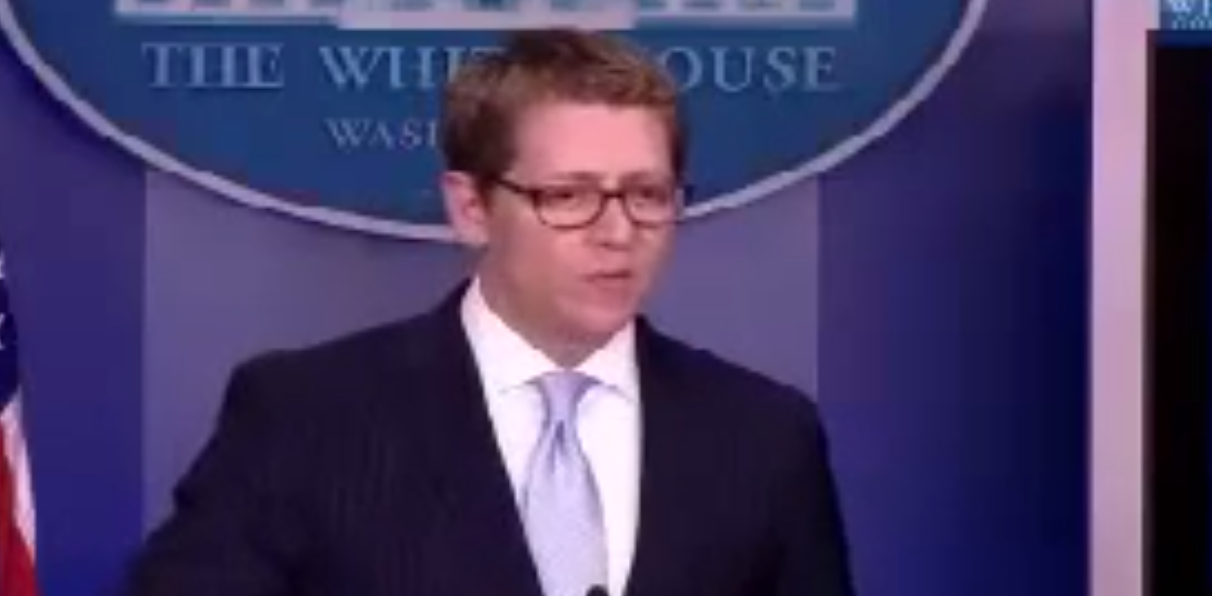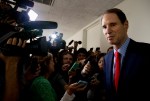ABC’s Jon Karl pressed White House press secretary Jay Carney in the press briefing Wednesday, seeking answers about the recently surfaced email that shows the White House’s involvement in crafting the Benghazi terrorist attack talking points.
Videos by Rare
Carney dismisses the email, saying it’s “not about Benghazi” about about all of the ongoing threats in the region at the time.
At the end, Carney wouldn’t even clear the record, when the White House said last year that they only changed one word of the talking point, and that they came from the intelligence community, something we now know to be false.
Watch
Full transcript:
Q: Yeah, to follow up on the new Benghazi email, you knew full well that these Sunday show appearances were going to be dominated by the attack in Benghazi, right? As they were.
MR. CARNEY: Well, we certainly knew that that would be a big part of the shows.
Q: A big part or the primary thrust of those shows?
MR. CARNEY: Jon –
Q: You just had an attack on a — (inaudible) — consulate in Benghazi. You had Americans killed. You knew full well that what Susan Rice was primarily going to be asked about was about that attack — a terrorist attack on a U.S. consulate in Benghazi.
MR. CARNEY: Can I read the promo from your show, ABC “This Week”?
Q: (Inaudible) — all the promos — (inaudible).
MR. CARNEY: As — Jon, as –
Q: You do acknowledge that these — (inaudible) — was going to be about the Benghazi attack?
MR. CARNEY: Absolutely, about — Jon, absolutely. And she — and that’s why, as members of Congress did, Ambassador Rice relied on points about the Benghazi attack that were produced by the CIA.
Q: So –
MR. CARNEY: When — hold on. As American embassies throughout the region remain under fire — that’s ABC “This Week” promo. Again, we prepare Q-and-As for administration officials based on what we think they’re going to be asked. When I come out here –
Q: But did you –
MR. CARNEY: Hold on, Jon. Let me finish my sentence at least. When I come out here, when officials go out on daily shows or the Sunday shows, they have to anticipate — we have to anticipate what they’re going to be asked.
It is often forgotten that during that time period there was an enormous amount of attention and focus, appropriately, on the fact that there were protestors, sometimes violent protesters, surrounding U.S. embassies, causing us to draw down personnel at those embassies, causing great concern, understandably, about the safety of American personnel at other diplomatic facilities around the Muslim world.
And that was a focus of a great deal of press attention, and thus would be, as the promos indicate, one of the areas of focus of those Sunday shows. And so a Q-and-A was prepared for that, as is the case every Sunday.
What was also the case is that Ambassador Rice was, on the matter of Benghazi, relying on talking points that were originally created for members of Congress at the request of members of Congress so that they could go on television and talk about what happened in Benghazi.
Q: Ambassador Rice went on those shows, and she said that the attack in Benghazi was rooted in protests over an Internet video. We now know that that was not true, that, in fact, the CIA Director, Morell, just — former Director Morell just testified last month that quote, “when she talked about the video, my reaction was, that’s not something the analysts have attributed this attack to.”
It did not come from the CIA. You stood there at the podium time after time and said that she was referring to talking points created by the CIA. Now we see a document that comes from the White House, not from the CIA, attributing the protests to the video, and we have the former director of the CIA saying that that was not something that his analysts had attributed it to.
MR. CARNEY: Jon, I would point you to what Mike Morell has said repeatedly in testimony about the creation of the talking points.
Q: Well, now we have new talking points, and you didn’t release them — (inaudible) –
MR. CARNEY: Let me finish, please. Jon, I answered that question. The fact of the matter is, there were protests in the region. The talking points cited protests at that facility. The connection between protests and video — and the video turned out not to be the case, but it was based on the best information that we had, and the fact that there were protests –
Q: It was not based on what the CIA was saying, Jay.
MR. CARNEY: Jon, I would point you to — I understand the –
Q: This is what Morell said just last month, that when he heard that, he said that is not something our analysts have said. So that, now we see, came from the White House, right?
MR. CARNEY: Jon — no, you’re wrong. If you look at that document, that document that we’re talking about today was about the overall environment in the Muslim world — the protests outside of Khartoum — the embassy in Khartoum, outside of the embassy in Tunis, the protests outside of the embassy in Cairo. These were big stories.
These were — this was a big problem. And this was an ongoing story through that weekend when Ambassador Rice appeared in the Sunday shows. So to suggest that we wouldn’t have answers to questions about those situations –and unless you’re telling me now that those protests didn’t have anything to do with the video, it was entirely appropriate to have a question-an-answer document prepared for the video. When it comes to –
Q: (Off mic.)
MR. CARNEY: Jon, let me finish.
Q: (Off mic) — say that the — that the attack in Benghazi was rooted in a protest over the video? That’s what she’s –
MR. CARNEY: I know that you and I are both in a different time zone right now, but we’re still in April of 2014, and this is a discussion about what she said and what turned out to be the case that we have had dozens of time in this room. And the fact of the matter is she went out there with the best information that we had at the time. The CIA deputy director has testified to that. The fact that there were protests around the region threatening our embassies at the very same time is something that is often forgotten but obviously affected the whole environment about how we perceived what was happening at the time. And again, the implication is that we were somehow holding back information, when in fact we were simply saying what we thought was right. And when elements of that turned out not to be true, we were the first people to say so. It was based on what we knew at the time.
Q: Why were you holding back this information? Why was this email not turned over to the Congress? Why was it not released when you released all the other emails? This is directly relevant. Why did you hold this back?
MR. CARNEY: Jon, again –
Q: Why did it take a court case for you to release this — (inaudible) –
MR. CARNEY: Jon, I can say it again and again, and I know you can keep asking again and again. This document was not about Benghazi.
Q: It was her prep for the — for the Sunday shows.
MR. CARNEY: It wasn’t her only prep, John (sp). She relied on her — for her answers on Benghazi, on the document prepared by the CIA, as did members of Congress.
We, the White House rather, and others involved in her prep said, when it comes to Benghazi, there’s been a document prepared by the IC so that everybody is working off the same information — Republicans in Congress, Democrats in Congress, administration officials — this is what we know and what we are able to say about Benghazi at this time, and that’s what she got.
On all these other questions, as is the case for every Sunday, when the Treasury secretary goes out, when the deputy national security advisor goes out, when other administration officials go out, documents are prepared that anticipate questions from the press and provide answers based on our policy and our best understanding of what’s happening at the time.
Q: OK, but –
MR. CARNEY: That’s standard operating procedure. And if you look at the document in question here, it is not about Benghazi; it is about the protests around the Muslim world outside of U.S. embassies, and what we know about them and what we should say about them based on our policies.
Q: Just one last question, just in the interests of clearing the record. You said at the podium last year that the talking points that Susan Rice used for those Sunday show appearances were a product of the intelligence community, that the White House and the State Department only changed one word. We now know — obviously we’ve known for some time that that is not true. Can you correct the record on that?
MR. CARNEY: Well, Jon, for the last time, there were talking points prepared on Benghazi, there were talking points prepared on the overall matter — the overall dynamic in the Muslim world about protests. The White House had a role in that document obviously, as this release makes clear, as the White House does every time a senior administration official appears on the Sunday shows, as was the case in the Bush administration, in the Clinton administration, in the first Bush administration, going back to the advent of television, I dare say. So that’s always going to be the case.
Q: So you’re not going to correct the record on this?
(Inaudible) –
MR. CARNEY: Jon, you know, when it comes to correcting records, you know, we could get into that. And the fact is those talking points were, as the deputy director of the CIA testified before Congress, as he has talked to the press about on Benghazi, were created by the CIA.



